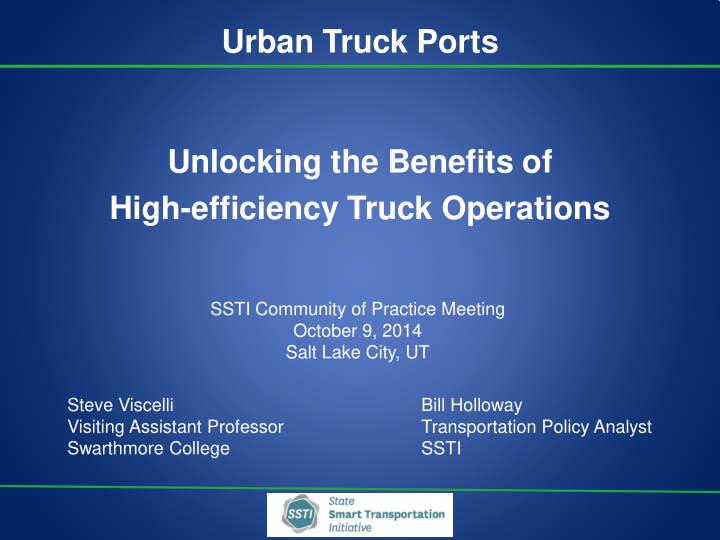



Urban Truck Ports Unlocking the Benefits of High-efficiency Truck Operations SSTI Community of Practice Meeting October 9, 2014 Salt Lake City, UT Steve Viscelli Bill Holloway Visiting Assistant Professor Transportation Policy Analyst Swarthmore College SSTI
The Truck Freight Challenge Increasing truck freight Worsening congestion Truckload Freight Average Annual Hours of Delay in 2014 volume = 100 Urban Areas 130 70 60 125 50 120 40 115 15 Largest 30 All Urban areas 110 20 105 10 100 0 1982 2000 2005 2010 2011 Source: ATA U.S. Freight Transportation Forecast to 2025 Source: 2012 Urban Mobility Report, Texas Transportation Institute 10/9/2014 2
The Truck Freight Challenge Rising fuel costs Diesel Fuel Price, 1994 - 2014 ($/gallon) $6.00 $5.00 $4.00 $3.00 $2.00 $1.00 $- Source: US Energy Information Administration Labor supply shortage Source: American Trucking Associations 10/9/2014 3
Urban Truck Port Network (UTPN): Part of the Solution? A network of strategically located facilities outside key urban bottlenecks to: Segment the duty cycle: transfer freight between local and long-distance trucks Dis/assemble long-combination vehicles Spur innovation in fuel efficient technology and operations Promote off-peak delivery 10/9/2014 4
Technology for the Rural Duty Cycle Gap Seal Full Skirt Rear Drag Device 10/9/2014 6
Long Combination Vehicles (LCVs) 10/9/2014 8
Technology for the Urban Duty Cycle • Braking allows for hybrids with significant fuel savings • Better low-speed torque reduces effect on congestion • Quieter and less polluting • Better visibility and shorter wheel base for increased safety • Lower weight reduces damage to surface streets 10/9/2014 9
Why Truckers Drive Through Congestion Extra Extra Capacity Capacity 10/9/2014 10
Off-Peak Delivery • Truckers prefer less congested conditions but cannot avoid them due to appointments and hours of service (HOS) • Much truckload freight is going to large facilities that are open 24 hours a day • Value of off-peak delivery systems has been demonstrated: Port of LA/Long Beach has moved 40 percent of container pick-ups to off-peak hours NYC off-peak pilot program recently completed received great reviews from truckers and their customers 10/9/2014 11
Urban Port Sites Congestion Levels and Urban Truck Port Locations for Chicago 10/9/2014 13
Benefits of an Urban Truck Port Network • Cuts congestion • Reduces fuel consumption, air pollution, and CO 2 emissions • Reduces the need for new infrastructure • Improves safety • Reduces hours of service (HOS) violations and driver turnover • Sets the stage for innovation • Improves ROI for fuel efficiency technologies on long-distance trucks • Allows for the use of new fuel and vehicle technologies for short-haul trucks • Reduces barriers to LCV use • Reduces shipping costs • Lowers fuel costs • Improves travel-time reliability 10/9/2014 14
Implementation Why the industry won’t do it alone: • Trucking is a low margin, highly competitive industry • Truckers are very conservative about new technology • There is little incentive: – Labor is paid by the mile – HOS are not enforced in urban areas (e.g. waiting time is not counted) – Costs of urban travel (e.g. air pollution, congestion, road damage) are not fully paid by the industry 10/9/2014 15
Getting Started We are near a tipping point – Intermodal is gaining, but there is only so much capacity – Congestion costs are growing – Industry is asking for more infrastructure and offering to pay Infrastructure and operating costs could be paid for by: • Public sector – Tolling peak-period traffic and/or through trips – Increased State or Federal fuel tax with refunds for trucks that use truck ports to facilitate off-peak deliveries. • Private sector – Fees for cargo storage, handling, and fuel at the truck port. 10/9/2014 16
Getting Started USDA grant • Explore how the truck port concept could help farmers access regional markets and improve access to fresh produce in urban areas • SSTI working with Center for Integrated Ag. Systems and others at UW-Madison • Partnering with agricultural shippers and logistics professionals • Engaging public and private sector stakeholders • Meeting in Chicago – Spring 2015 • Develop pilot project 10/9/2014 17
Comments/Questions Steve Viscelli viscelli@cows.org Bill Holloway holloway@ssti.us 10/9/2014 18
Extra Slides 10/9/2014 19
Benefits of Available/Near-Term Technologies by Type of Trucks The Challenge of Increasing Tractor-Trailer Fuel Economy (FC) 10/9/2014 20
10/9/2014 21
10/9/2014 22
Major US Freight Bottlenecks 10/9/2014 23
An Example: Chicago • Contains six of the twenty-five worst bottlenecks in the US, generating $556 million in truck delay costs annually. • In metropolitan Chicago, fully two-thirds of the need for new roads in the next twenty years will be due to increased truck traffic. 10/9/2014 24
Recommend
More recommend